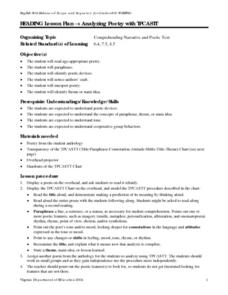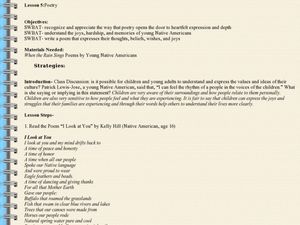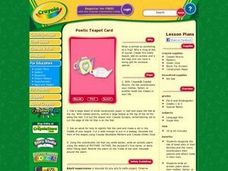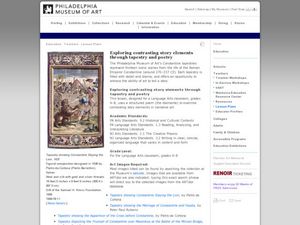Curated OER
Breaking up a Poem
Seventh graders break down the barriers in reading, speaking, listening, writing and understanding poetry. As a whole group, they establish their own criteria for line breaks by discussing questions and taking notes on a PowerPoint...
Curated OER
The Power of Poetry
Sixth graders read several poems and choose one to create a Powerpoint presentation. They create original illustration for the poems and use graphics from software resources. Students are then are given jobs in order to create a...
Curated OER
Holiday Poetry and Music
Students discuss Thanksgiving and Christmas holidays and family traditions. After brainstorming how holidays are celebrated, students write a poem about a chosen holiday and create their own hand-made instrument. They share their poems...
Curated OER
Analyzing Poetry with TPCASTT
Middle schoolers read a poem and complete a TPCASTT chart. They make a prediction about the title (T) , paraphrase each line (P), identify poetic devices and nuances (C-connotation), explore mood and tone (A-attitude), point out shifts...
Curated OER
Rhythm, Verse and Rhyme: COMPOSING A LIST POEM
Students are provided an opportunity for self-expression. They collaborate with a partner and compose a list poem. Students practice reading and writing skills. They explore lists and catalogues--both elements of poetry and practical...
Curated OER
Poetry Gifts
What kind of shoe is this person? What time of day is this person? Aspiring poets’ responses to a list of questions provide descriptive words and phrases that can be crafted into a blank verse poem. A link to sample poems is provided.
Curated OER
Poetry: An investigation of Life
AP English Language and Composition requires that class members be able to formulate an argument and support it. Use this resource to focus on the life of Emily Dickinson. It requires individuals to research her life and make inferences...
Curated OER
Use of Personification and Imagery in Poetry
A reading of Theodore Roethke’s dark "Root Cellar" and Sylvia Plath’s more abstract "Mirror" launches a discussion of imagery and personification in poetry. After finding examples of personification in the poems, class members craft...
Curated OER
Poetry: When the Rain Sings Poems by Young Native Americans
Poetry can express feelings, values, and culture; it also provides insight into a time and place. Young analysts discuss the meanings of several poems from a collection of Native American works entitled, When the Rain Sings. They then...
Curated OER
Poetic Teapot Card
Students recognize the role of loved ones in their families and the many things their parents and others contribute to their lives. They write an acrostic poem about their mother, father, or other important person. They then make a...
Curated OER
Using Similes and Metaphors in Poetry
The use of similes and metaphors will become more clear and your students will gain knowledge and comprehend the meanings of the words with these activities. They compose interesting similes and metaphors based on visual prompts and...
Curated OER
Exploring Contrasting Story Elements Through Tapestry and Poetry
Young thinkers view two narrative art tapestries and study the images included that tell a story about the Roman Emperor Constantine. As they examine the details of the tapestries, pupils use a Venn Diagram to record the similarities and...
Curated OER
Irony in Poetry and Prose (Fiction and Non-fiction Texts)
Middle and high schoolers examine the impact of irony in poetry and prose. In this figurative language lesson, they read instructor-selected literature and identify uses of irony. Then they discuss how irony enhances literature.
Brethren High School
Romanticism Through the Eyes of Art, Poetry, and Technology
Use this simple collaborative activity to introduce the definition, art, and poetry of romanticism. Educators will have to provide the poetry, images of the art, and the survey for the learners, but by using this resource, they won't...
Curated OER
Cinquain Syllables
Students identify and analyze various forms of poetry, then use information gathered from research to write their own cinquain poems. They then identify each syllable of their cinquain with a small icon that reflects the theme of their...
Curated OER
Poetry Pals
Students create the components for a slideshow featuring their own poetry, illustrations, and music. This lesson uses auditory, visual and kinesthetic (signing and clapping) learning styles.
Curated OER
A Light in the Attic
Review selections from Shel Silverstein's A Light in the Attic and recognize characterization and tone used. Discuss and compare the various tones of each poem. Learners complete a character map and a pair share activity as well. Have...
Curated OER
Exposure: A Poem by Wilfred Owen
Here’s a great way to engage your pupils in poetry analysis. Show your class this student-produced, PowerPoint analysis of Wilfred Owen’s “Exposure.” Have your class critique the strengths and weakness of the presentation. (They are sure...
Curated OER
Cloud Poems
First graders make daily observations about clouds, write in their cloud books, make cloud charts, and make a poem about clouds.
Curated OER
Write Acrostic Poetry
Third graders explore acrostic poetry and use names of their favorite personalities from television, music, or sports. They write descriptions for each letter of the person's name.
Curated OER
Poetry--Homeless People
Eighth graders create a poem about homeless people using images they saw on websites. After reading the book "The Outsiders", 8th graders make connections of real life homeless people with characters in the book. Students search the web...
Curated OER
Visualize and Draw to Increase Comprehension
Improve readers' comprehension with a pair of visualization opportunities. First they listen, eyes closed, as you read a description from Roald Dahl's James and the Giant Peach, and discuss ideas about what they "see." After you read...
Curated OER
Colorful Creative Writing Rebus
Students read rebus samples from various sources. They write poems about colorful places, including detailed descriptions of people, scenery, and objects. Students create small, relevant illustrations to communicate meaning using symbols...
Curated OER
Nonsense Knows
In this poetry lesson, young readers discuss that poems can sometimes have silly words and made up people, places, and things. Students read and listen to silly poems then write a response poem to their favorite.
Other popular searches
- Poetry Analysis
- Poetry Alliteration Examples
- Poetry Alliteration
- Writing Poetry
- Concrete Poetry
- Poetry Unit
- Introduction to Poetry
- Poetry Lesson Plans
- African American Poetry
- Figurative Language Poetry
- Free Verse Poetry
- 6th Grade Poetry Unit

























